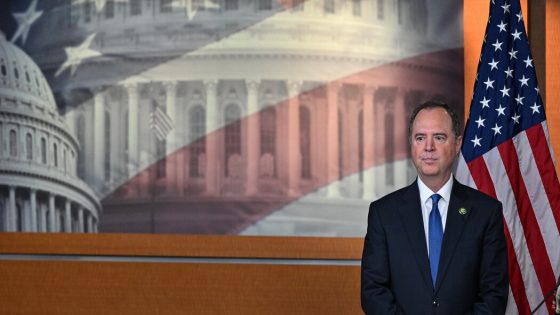Before Representative Adam B. Schiff became famous as the chief congressional tormentor of former President Donald J. Trump, his professional hallmark was his low profile.
In a Southern California district glittering with show business, he was simply “the congressman from Burbank.” In a state teeming with Democratic political stars, he was rarely on short lists for higher office.In Congress, his calling cards for years were the Democratic Study Group on National Security — also known as “the nerd caucus” — which he co-founded, and his knack for securing federal dollars for light rail in Greater Los Angeles.
Now Mr. Schiff is a national figure and the favorite to become the next California senator, buoyed in his liberal-dominated state by his anti-Trump bona fides: lead manager during the former president’s first impeachment trial and proud recipient of a censure once Republicans took control of the House.
As Tuesday’s primary draws near, Mr. Schiff is the Democratic front-runner, and polls suggest he may be on a glide path to the seat, which was held by Senator Dianne Feinstein for more than 30 years until her death at age 90 in September.
A coveted endorsement last year from the former House Speaker Nancy Pelosi, a longtime ally, unleashed a gusher of support from influential Democrats and wealthy donors, including from tech billionaires in recent days. None of Mr. Schiff’s two dozen or so rivals have come close in fund-raising.
And, to the frustration of the most liberal Democrats, he and his allies have shrewdly maneuvered to sideline the woman who was the biggest threat to his election, Representative Katie Porter, by spending a barrage of campaign funds to elevate a novice Republican candidate, the former baseball star Steve Garvey.
Mr. Schiff, 63, is taking no chances on the ground, either — now exhorting farmworkers in Salinas, now shaking hands at a Sunday meet-and-greet in San Diego.
“My view is always, run scared or run unopposed,” he told reporters after posing for selfies with a rain-soaked crowd of about 80 people on Saturday at a get-out-the-vote rally at a Sacramento union hall.
Mr. Schiff has consistently been the front-runner, based on polls, since the Senate race began in earnest more than a year ago. An establishment pick, he locked up endorsements from most of his Democratic colleagues in California’s sizable House delegation, the reward for his years of support for their campaigns. And Ms. Pelosi had made it clear publicly and privately that she wanted Mr. Schiff, her reliable California lieutenant, in the Senate, putting her formidable thumb on the scale.
For months, it was conventional wisdom that the race would come down to Mr. Schiff and Ms. Porter, who has represented an Orange County district since 2019. Unlike in most states, California’s “jungle” primary rules allow for two candidates from the same party to face off in the general election, and the two House members had amassed the most support and money. (A third Democrat, Representative Barbara Lee, whose district includes Oakland, has attracted progressive backing, but consistently lagged her House colleagues in polls.)
It was setting up to be a November clash of intraparty values — the liberal Ms. Porter versus the moderate Mr. Schiff. From the start, Mr. Schiff outraised Ms. Porter nearly 2-to-1, garnering more than $31 million since January from donors across the California spectrum, including business and tech leaders, entertainment figures, organized labor and tribes that operate California casinos.
But the entrance of Mr. Garvey, who still has name recognition in California from a baseball career — with the Los Angeles Dodgers and San Diego Padres — that ended more than three decades ago, upended that Democratic collision course. It also presented an irresistible opportunity for Mr. Schiff to knock out Ms. Porter, his most competitive Democratic rival, in March.
Over the past month, Mr. Schiff and his allies have run millions of dollars’ worth of ads promoting Mr. Garvey as a Trump supporter and the conservative in the race. Meanwhile, a political action committee funded by Silicon Valley billionaires and cryptocurrency investors has spent some $10 million on ads against Ms. Porter, a consumer advocate and protégé of Senator Elizabeth Warren of Massachusetts. Mr. Garvey’s poll numbers have only climbed.
If Ms. Porter finishes third, her campaign is over. And Mr. Garvey, a political novice, is considered an easier opponent to beat in a state that has not chosen a Republican statewide since former Gov. Arnold Schwarzenegger was re-elected in 2006.
Mr. Schiff’s tactic has been rebuked by Ms. Porter as cynical and antidemocratic. “Career politicians shouldn’t get to manipulate the electorate and buy themselves a promotion,” Ms. Porter’s campaign asserted in a fund-raising email last week.
It has also been a sign that Mr. Schiff, despite his cherubic face and controlled intonations, is willing to play hardball.
That’s the side of Mr. Schiff that Republicans emphasized during the Trump presidency, when they treated “the congressman from Burbank” not as a studious policy wonk but as a political actor to be dealt with. As Mr. Schiff became the face of the Democratic charges that Mr. Trump’s campaign team had colluded with the Russian government, Republicans attacked him as corrupt, politically vindictive and in pursuit of a case they said was unfounded.
Even his bookish style was grist for Mr. Trump and his supporters, who derided him as “Shifty Schiff” and as an uptight “Pencil Neck.” Worse than the ridicule was the disturbing intimidation that Mr. Schiff, his wife, Eve, and their children have faced.
At least four people have been arrested on accusations of making death threats against him. “A couple of years ago, someone sent two bullets to my office with the names of my two kids on them,” Mr. Schiff said last week.
Before the Trump era, he was known for his reserve and moderation. Close friends extolled his dry sense of humor, but his public bearing was more that of the federal prosecutor he had once been, formal and bland. His personal habits — he is a triathlete and, because of his high cholesterol and his wife’s influence, a vegan — convey discipline.
His father was a Democrat, his mother Republican. The descendants of Jews who had fled Eastern Europe, his family lived in Massachusetts before moving to Arizona and then Northern California.
Even in his younger days, he was more overachiever than rebel. He was voted most likely to succeed at his high school in Danville, Calif., east of Oakland, and graduated with distinction from Stanford University in 1982.
As an undergraduate, Mr. Schiff lived upstairs from a group of stoners and sometimes tormented them by waiting until they were high, then attaching a pizza slice to a fishing line and dangling it just out of their reach, according to one close friend, Tom Umberg, who is now a Democratic state senator. (“Fact check true,” a campaign official texted tersely when asked to confirm.)
At Harvard Law School, he and some friends once dressed as the black-hatted, troublemaking droogs from “A Clockwork Orange,” the dystopian novel that became a classic 1972 Stanley Kubrick film. It was enough to win first prize in a Halloween contest, “a bottle of gin, which one droog drank to excess,” Mr. Schiff recalled, laughing. “And it was not me,” he was quick to add.
Mr. Schiff, who joined the U.S. attorney’s office in Los Angeles two years after his graduation from law school, said he became interested in public office after his successful prosecution of Richard Miller, a former F.B.I. agent who was convicted in 1990 of spying for the former Soviet Union. The case, Mr. Schiff has written, was an education in K.G.B. tradecraft that later informed his views on the Trump campaign’s contacts with Russian intermediaries in the 2016 election.
Mr. Schiff ran for a Los Angeles-area State Assembly seat in 1994, in what was then a conservative district, oblivious to the local machine politics and the expense of campaigning in California. He was crushed twice before he was encouraged to try for State Senate in 1996.
At 36, he became the Senate’s youngest member, a law-and-order centrist representing the communities around Pasadena. In 2000, he ran for Congress and beat Representative James E. Rogan, a Republican who had been a manager in the 1999 impeachment trial of former President Bill Clinton.
The battle set a record at the time for spending in a House race, fueled by lingering fury over the Clinton impeachment. This time, however, Mr. Schiff had powerhouse fund-raisers, including the show business mogul David Geffen and Ms. Pelosi. He won by 9 points and has won every general election by double digits since.
In the House, he became a stalwart ally of Ms. Pelosi, but he also worked with Republicans to secure federal money and projects for his district, which now runs from West Hollywood to West Pasadena. In the Senate, he has said, he will do the same, following Ms. Feinstein’s example.
Critics are skeptical. Throughout Congress, polarization has made bipartisanship a disadvantage and Mr. Schiff is an acclaimed MAGA foil now.
After Mr. Schiff dramatized a description of Mr. Trump’s phone call with the leader of Ukraine in the run-up to the first impeachment hearings, Republican lawmakers accused him of fabricating evidence and overstatement. He also asserted that he had not had any contact with the whistle-blower who incited the inquiry, when the whistle-blower had approached the panel for guidance before filing his complaint.
During the party-line House censure of Mr. Schiff last year, Republicans charged that he waged an “all-out political campaign built on baseless distortions” in Mr. Trump’s first impeachment proceedings, in which the Senate’s Republican majority acquitted Mr. Trump. Mr. Garvey has sharpened the accusation, saying Mr. Schiff was censured because he “lied to 300 million people.” Mr. Schiff has retorted that he was censured “for standing up to a corrupt president.”
On the left, progressive Democrats in California worry that Mr. Schiff is too cautious. They prefer two of his rivals — Ms. Lee, who was the only House member to vote against military action in response to the Sept. 11 attacks, or Ms. Porter, who became popular among Democrats for her tough questioning of corporate leaders and Republicans during congressional hearings.
“He’s been a quiet, behind-the-scenes congressman who has done all the right things and checked all the boxes,” said Chris Ward, a Democratic state assemblyman from San Diego who has endorsed Ms. Porter. “He did a really good job in leading the investigation into Trump, but other than that, I’m not sure what he’s going to offer that’s transformative.”
Mr. Schiff has policy ideas that include increasing federal funding to combat homelessness and expanding paid leave for families. And he has released sweeping proposals to end the filibuster, eliminate the Electoral College and add four justices to the Supreme Court.
His major policy priorities differ little from those of his Democratic rivals. Debates have dwelled on whether earmarks should be used to secure federal funding for home districts — Mr. Schiff approves, Ms. Porter argues it breeds corruption — and the conflict in Gaza. Only Ms. Lee, who is a distant fourth in polls, supports calls for an unconditional and immediate cease-fire. Mr. Schiff has said Israel “must make every effort to avoid civilian casualties” but that Gaza is governed by “a terrorist organization” and Israel must be expected to defend itself.
As the voting deadline has neared, however, the focus has been less on Mr. Schiff’s policy plans than on his long-term prospects. “I don’t bet on these things,” Christian Grose, a professor of political science and public policy at the University of Southern California, said last week. “But if I did, I’d say Adam Schiff will likely be the next senator from California.”
Source Agencies




